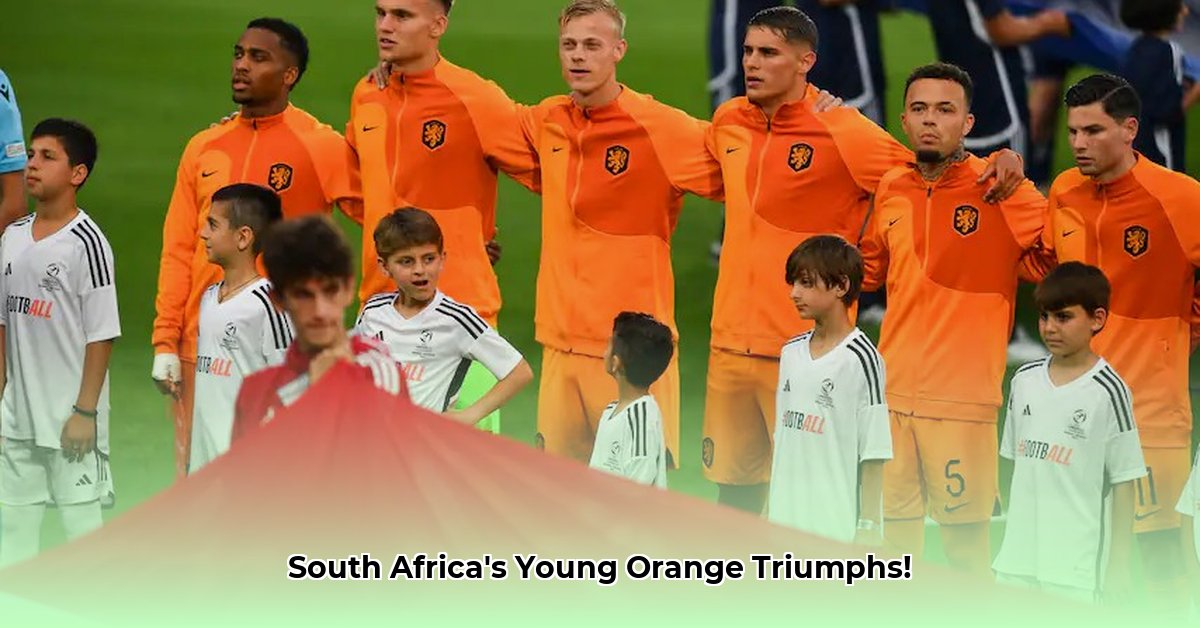
Jong Oranje Jong Oekraine: A Nail-Biting Win and the Road Ahead
Jong Oranje's rollercoaster ride to the U21 Euros quarter-finals culminated in a hard-fought 2-0 victory over Jong Oekraine. While the win secures their place in the next round, it also highlighted areas needing urgent attention. The match provided a fascinating case study, showcasing both the team's undeniable potential and their persistent weaknesses. Early performances were characterised by missed opportunities and narrow victories, leaving their qualification hanging by a thread. But against Ukraine, they seemed to shift gears, securing a more convincing win—although the red card to Regeer served as a sobering reminder of their defensive frailties.
How did they manage to clinch this crucial victory? Were the changes merely tactical, or did a deeper shift in team dynamics play a role? This report delves into the specifics of the victory, outlining their successes and failures to determine the steps needed for sustained success.
The Ukraine Match: A Turning Point?
Goals from Valente and Van Bergen sealed the win, a marked improvement from their previous shaky performances. Yet, this victory wasn't without its blemishes. Regeer's red card underscores a continued vulnerability in defence, raising concerns about their ability to withstand more potent attacks from stronger opponents. While the victory is deservedly celebrated, it also raises questions about their long-term competitiveness. Can this team replicate this performance against a stronger, more experienced opponent?
Star Players and Tactical Tweaks: Who Stepped Up?
Taylor and Hato shone brightly, orchestrating attacks with a precision not consistently seen in previous matches. Van Bommel and Valente's incisive runs caused havoc among the Ukrainian defence, showcasing individual brilliance. However, Jong Oranje's reliance on individual flair instead of cohesive team play remains a cause for concern. Coach Reiziger's tactical adjustments proved successful, suggesting an increasing ability to adapt during games. This tactical prowess, however, is still not enough to compensate for underlying structural defects.
Did Coach Reiziger's tactical adjustments directly lead to the win? Or was it the star performances that made all the difference? This is a crucial question that necessitates a breakdown of the tactical alterations and player performance.
The Good, the Bad, and the Ugly: What Needs Work?
Jong Oranje boasts a potent attack capable of creating numerous goal-scoring opportunities. However, their conversion rate remains worryingly low, highlighting a critical need for improved finishing skills. Meanwhile, the defence, despite its occasional brilliance, requires significant strengthening. The team's reliance on individual brilliance rather than coordinated team play needs to change. Consistency, both in performance and results, remains the biggest challenge.
Portugal Awaits: The Next Big Test
Next up is Portugal, a team with undeniable skill and experience. To progress, Jong Oranje must maintain their improved defensive solidity and improve their clinical finishing. The match against Portugal is therefore a critical test of their improved form and overall resilience.
Can they maintain this level of performance against a team like Portugal who are predicted by many experts to be among the tournament favourites? A thorough analysis must identify precisely what factors need improvement to ensure continuing success.
The Road to Improvement: A Plan for Success
To achieve their tournament ambitions, Jong Oranje must focus on these critical areas:
- Finishing: Intensive finishing practice is paramount, focusing on pressure-based drills and strategies to improve composure. Long-term, this translates to implementing advanced shooting techniques and mental resilience training.
- Defence: Improved communication, teamwork, and strategic drills are needed to consolidate their defensive structure and create more flexibility against diverse opponents.
- Team Cohesion: Strengthening team bonds and leadership development, coupled with an emphasis on collective play rather than individual brilliance, will solidify their effectiveness.
The journey is far from over, but with improved clinical finishing, a more robust defence, and enhanced team cohesion, Jong Oranje has the potential to make a deeper run in the tournament. Their performance against Jong Oekraine suggests a blend of individual brilliance and an evolving team spirit, paving the way for future success.